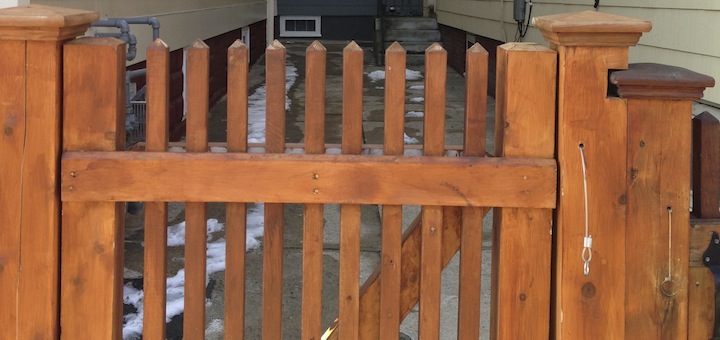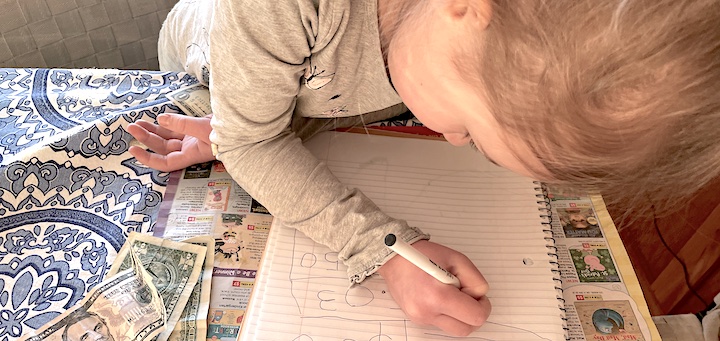
Apparently the stock market is doing terrible things right now. But I don’t care. Monitoring the market like Frugal Hound stalks squirrels is a patently useless waste of time, energy, and brain capacity (same for FH as she’s tethered to a leash and, uh, the squirrels are decidedly not). There’s simply nothing to gain by it.
So while the rest of the world frets over the machinations of the market, I’m taking a different tack. I’m not going to tell you how to optimize your investments or beat the market or pick that one hot fund… why not? Because I don’t know how to and neither does anyone else. No one can predict what the market will do and there’s no secret formula for beating it.
What You Can Do
There are, however, two surefire ways to beef up your investment portfolio: 1) increase your savings and, 2) increase your earnings. I realize this is ridiculously less sexy than playing day trader on your phone in your cubicle, but, these are the only things that are 100% guaranteed to work.
My approach to all things in life is to control what I can and to categorically ignore/let go of the things I can’t.
Let’s be clear here, I’m not always successful at this, it’s merely what I aspire to do. The stock market is firmly in the camp of things I can’t control and so, I pay it no heed. No heed at all. I used to spend momentous amounts of time and effort trying to alter the course of events beyond my control, which worked a whopping 0% of the time.
But in the genre of things you can impact… If you increase your rate of savings–say, through some hardcore frugal action–then you’ll have more money to invest. And if you increase your income, then you’ll have more money to save. These, my friends, are the variables that you absolutely can control. Dips in the market, conversely, are entirely beyond our purview. Since investing is a scenario in which your gains are only as substantial as your inputs, focus your energy on increasing your inputs.

While it might not sound thrilling to save extra dough just to plough it into the market, consider for a moment our dear old friend compounding interest. Frugal Hound the Magical Compounding Interest Unicorn is back again to remind us all of her awesome non-squirrel-catching-related powers. Compound interest is interest added to the principal such that your interest earns interest. This is a sweet, sweet thing. Very simply, it’s the function of money begetting more money. The more money you have invested and the longer it’s invested for, the more money you’ll make from your investments. Here’s an incredibly impressive math equation for ya: money + time invested = more money. We’ve established I’m horrific at math, right? But even I can understand this one.
Wondering where to start with setting aside more funds for your very own magical unicorn of compounding interest? Start by tracking your monthly spending and identifying where you can make cuts (I bet you a dollar you’ll be able to find something you can frugalize further). Mr. FW and I use Personal Capital for this task, which has the superb advantage of being both free and easy to use (you can sign up here if you’re so inclined).
Can’t Touch This Stock! (aka stay invested)
This is another variable that you have almighty control over: the duration of your investments. The longer you stay in the market, the better off you’ll be. Pulling in and out of the market when you feel the slightest twinge of panic is a great way to ensure you’ll never make any money from your investments. Money has no emotion, it doesn’t care if the market’s up or down–don’t impose your human sentiments on it. Instead, trust in the long range benefits of market returns.

Mr. FW and I bought our first stocks in 2008 as everyone else was fleeing the scene and we’ve let them ride ever since. Additionally, a portion of every single one of our paychecks goes automatically into our investments. One of the keys to maintaining your sanity in the market is to invest regularly and stay invested.
You’ll drive yourself nuts if you try to pick the perfect moment to start investing–much like brushing your teeth every day, it’s something you should do regularly and without fear or drama (unless you have some sort of bizarrely dramatic oral hygiene routine). In order to reap those glorious unicorn benefits of compounding interest, you’ve got to have the time component of the equation on your side (remember: money + time invested = more money!)
Investing is a longterm proposition–it’s not something to track or speculate about on a daily, or even yearly, basis. Mr. Frugalwoods and I consider our investments to be part of our very long range plans and have no intention of withdrawing them anytime soon.
Note that this longterm approach is why you don’t want to have your emergency fund invested. It’s important to have that reserve of cash on hand in the event of an unforeseen demand on your funds. So while you want to funnel as much as you can into your investments, don’t put every last cent in there. Conventional wisdom advises keeping at least three to six months worth of living expenses in cash (I lean towards six months because I’m a bit conservative, but many folks feel good with three months worth).
How Do We Invest?

In case you now have the burning question of how Mr. FW and I invest, here’s our quick (and easy/boring) rundown. We have two portfolios of stocks: our taxable investment account and our 401Ks. Our taxable account is invested fully in the low-fee total market index fund (FSTVX). Our overall portfolio is weighted 90% total market index fund and 10% bonds, with the bonds being held in our 401Ks in order to maximize tax efficiency.
Both of our 401Ks are in low-fee index funds as we’re staunch believers in avoiding fees whenever and wherever possible. Once a year, we spend 5 minutes rebalancing our portfolio to match our desired asset allocations. The most important aspect of managing stocks is to choose low-fee index funds, and then resist the urge to tweak, tinker, or otherwise do anything with them, other than shovel in more money.
And herein exists a fourth variable over which you can exercise your all-encompassing power: choose funds with low fees. This simple decision will save you epic amounts of cash over your investing lifetime.
The Zen Art Of Losing Money
Is my portfolio down right now? Oh most definitely. But I have enough other stuff to worry about in life (i.e. will baby spit-up permanently stain our hardwood floors, because it’s kind of looking like that right now… ). What the market is/is not doing doesn’t rise to a level that causes me even mild heartburn.
While some folks love/hate watching the market, I find that I prefer to ignore it entirely. Paying attention to it isn’t going to make things better or easier. It’s not going to increase the amount of money in my account and I tend to think it would be bad for my health (you know, stress and all that). You’d be much better off focusing your energies on reducing your grocery budget–now that’s a vastly more achievable, tangible goal that’ll yield actual benefits.
Consternating over the stock market is akin to divining what goes on in Frugal Hound’s brain–it’s a futile endeavor sure to leave you flummoxed and bereft. Turn your attention instead to more productive endeavors (like helping me figure out how to remove baby spit-up from, well, everything… ).







Our investment approach is similar, though we still need to diversify to 10% bonds. Sometimes we will put more toward investments instead of mortgage prepayment when the market is down, but are certainly not going to start selling when it’s back up. We are also using a taxable accounts for our IRA as it allows us to get that magical compounding power rolling at about a 25% increase by not paying taxes now, and since we plan to remain frugal with our withdrawals much later. Is this your thinking, too?
Completely agreed — and for all the talk about the “chaos” in the market over these past few weeks, the S&P 500 is down only 8% year-to-date as I write this. That’s a small and extremely common dip for the stock market. If you can’t handle that minor a drop without panicking, perhaps the stock market isn’t for you!
I agree, 8% is not catastrophic. The media likes to make it that way for ratings. Ratings = Money. No one should be pulling out and stuffing their mattresses yet. 🙂
Uh oh, we’re down 11% YTD now. I take it all back! Sell, sell, sell!
We practice a low-cost (index funds), Boglehead approach-aka, set it and forget it. Like you, we’re not whiz kids when it comes to this sort of thing. We know the basics, and that’s all anyone really needs to know. Fortunately, we still have time on our side so we don’t care what the markets do, ever. Instead of focusing on how much we’ve “lost” lately, we think about how much we’ve been able to buy on sale! WooHoo! Just recently we were able to trim a substantial amount of money from our monthly expenses. You better believe that money was funneled into the investment fast lane! This sort of approach keeps us motivated and our heads out of the sand. Great advice, Magical Unicorn!
Mrs. Mad Money Monster
Up until January 1, I neurotically checked my Vanguard account. It was awful. Someone should have bought stock in Tums 😉 “Looking less” was one of my financial goals for this year, and I’ve apparently decided to go cold turkey. Having studied our accounts scrupulously in August, I have a pretty good idea of what I’d see now if I looked. For now, I’m trying to tune it all out. We’re not pursuing early retirement, so we have the benefit of time on our side. My new approach might be bookmarking this page and looking at Frugal Hound the Magical Compounding Interest Unicorn whenever I get really stressed. The unicorn knows what’s up 🙂
I actually monitor our investments quite a bit, but it’s also based out of sheer curiosity. It’s a read-only approach for me, just to see how everything is flowing. Some times we are up. In 2016, everybody and their brother is down. It happens. Big deal, move on.
Investing in the stock market is most definitely for the long haul. Even the most basic guidebook written for kids makes this point very clear, but yet, there are so, so many people who either don’t understand that concept, or have highly paid “financial advisors” that make money when cash moves around. Sad indeed.
The trouble I have is when trying to log on to Vanguard and get my tax statements. I put a piece of paper across the bottom 2/3rds of the screen so I can’t see what’s going on. I have no clue even what the stock market has done the last three weeks, except that I’ve heard people saying it’s been a bad year so far. I can’t help worrying a little but it’s less than if I knew the whole story. It’s kind of like not looking at the clock when you can’t get to sleep at night.
When the markets are down, I just look at it as though I found an unexpected coupon for something (the investments) I was going to buy anyway. And that’s always a bonus!
I monitor the market. But the only action I’m allowed is to buy more. I like knowing why the market is moving. Some of it feels a little like gossip. “What happened? That’s not good. How bad do you think she’ll react? Oh she’s mad.”
I don’t have stocks or whatever you call them. I have money in my account, money in my pension plan and money in 100% safe RRSP’s. I don’t like playing with my money. I need it to be safe. This is just me. I don’t think it’s “”a patently useless waste of time, energy, and brain capacity””, because some people do make money out of it, but it’s not my thing.
Isabelle, RRSP a great idea. I don’t live in Canada but do have TSP here in the states. I retired on a pension, have stocks (falling prices). I’m 62 and did not draw on TSP yet but mandatory withdrawal is age 70 so I have plenty of time you decide what to follow with that money. I have found that investing in stocks with dividends worked for me.
We are looking at this as a long term investment so we don’t fret about it. When something performs really well (one fund had a 30+% return last year), we take what we made and put it in somewhere safer. In Canada we have RRSPs (I believe they are similar to your 401K or a Roth RIA – they aren’t taxed now – you pay tax when you withdraw them). You have to purchase them before the end of February to get the tax benefit for last year. The market slump = sale for us, so we are happy to put some money in. We know we won’t need this money for at least 20 years, so we can rid the wave!
We are a retired couple in our 60s with substantial savings from the sale of our house, and for us at our age, not looking at what is happening in the market and just riding it out does not work. Our “long haul” is much shorter than yours. 10% loss to your portfolio is also a point at which it takes a lot longer to make up the loss due to decreased principal. We did pull our money out of the market months ago when things started bouncing wildly around, and have it sitting in a 1.0% savings account for now, where it is at least not going backwards. We also pulled out before the huge drop in 2008. I don’t believe the old adage of just putting it in and riding it out applies anymore in this global economy. When the market is obviously on an upward trajectory we are in, but it also has down periods and you can lose all your gains and then some if you are not careful.
Can’t help you on either…..like you, too much work and other things taking my attention right now, and it’s been waaaaaaaaaaaayy too long since baby spit-up days. 🙂
I have kind of stopped checking my investment accounts too – just because it isn’t fun. I did however knock back our monthly investment accounts – not because of the market moving downwards, but more because the industry with both work in is being pummeled (oil), so we figure we should build up a bigger than normal emergency fund in case we both get laid off this year. Luckily – we live on one salary, so one of us getting laid off isn’t bad – but if we both do – I don’t want to have to sell our investments at a loss!!!
I completely agree with you, and I would like to add that I extend this approach to all arenas of my life. Where it seems like everyone else is going crazy watching the news over the latest horrific disaster or mass murder, I am blissfully unaware of all the things that are depressing AND out of my control.
Forgive me if this is an ignorant question, but is income from your taxable investment account accessible before standard retirement age? I get confused when I see people with plans on early retirement/financial independence throwing all their savings into investments that I thought weren’t accessible until ~65. Seems like it wouldn’t do any good. But I don’t understand investments so maybe I’m missing something.
Only their 401K is a retirement account! The other account is an investment account that (for the most part) they could take money out of anytime!
Really don’t pay much attention to the stock market except the headlines of the day. However, with all the commotion about China’s economy being “down”, I was floored to learn that this is because their economy “only” grew at 6.8% last year! Are you kidding me?! That’s almost twice the US economic growth, and somehow this is the cause for panic? Laughable…. In light of that, Mrs FW has it dead on when she says don’t pay attention to the markets.
We also are not freaking out over it. Set it and don’t touch it, but I do check it however (for graphing purposes). Our asset allocation is set aggressive despite our 5-10 year retirement time frame (puts us under 49). However, we’re taking that risk because if all is really bad, we can just work a little longer. Rebalance automatically on our birthdays. Always track our spending. Soon however, we’ll need to set a portion to “not as risky” though. Readjusting the portion you want for the short-term while leaving the rest for mid and long term growth is something we still need to learn how to do, because the money we want in 20 years can remain in the aggressive allocation.
This is a good reminder! Back when I was dumb enough to have a financial advisor (complete with high fees), he was always shocked that I never contacted him during market fluctuations. I have since come to my senses and switched to Vanguard, but I must admit that I’ve checked my balance a few times over the past couple of weeks… but no more! It’s not worth the anguish! One thing that helps is that when I travel, I often go to places without Internet access, so I get out of the habit of doing things like checking Vanguard. I have a trip coming up, so I think that will help. (But no worries, I’ll be looking for Frugalwoods updates as soon as I get back!)
Spit up tends to be acidic, so if you didn’t have the opportunity to wipe it away immediately, it probably ate away at the sealant and maybe the stain too. The good news is that you can actually spot treat hard wood floors by sanding and applying a new sealant/varnish that matches the old. However, don’t bother doing this until babywoods is exclusively eating solids. She’ll spit up for a good long while, and it’s not worth it to try and fix one such instance when you’ll surely have at least 2-3 more.
I mean, yeah, ignore the markets.
I just polished off an entry about asset allocation and how much I love Bogleheads. We’re in the same boat at 10% bonds, but we have another 8% in Lending Club notes, which are like bonds, but pay more interest. Another 5% in REITs, and the rest is stocks. I would recommend re-balancing more than once a year just because you get to naturally sell assets that are overpriced and buy assets that are underpriced, at least relative to each other. I have a spreadsheet that does the calculation and if I see something more than 5% out of whack, I’ll re-balance.
I usually don’t pay attention or time the market at all, but I’ll admit I plowed a bunch of money into our Roth IRAs this month after the market took a dive. I was going to spread out the rest of our 2015 contributions over Jan-Mar but figured, why not? Seems like a good time to do it.
It is great to know you’re on the right track when, despite giant market losses, you still see your net worth increase. I’m working on focusing on that. And at times like this when the market tanks, I’m way more motivated to hustle hard because everything is on SALE in the market and I need to BUY NOW! 🙂
We have half of our investments in insured CDs, not getting terrific returns, but we’re 70 and have been retired for almost 16 years. What’s in equities is, hopefully, for our children, so I ignore it, but my husband still checks it EVERY day. He stresses, I don’t !
I’ve been “playing the market” now for 22 years and wish I had known then what I know now. One wise stock investor said he saved his money during the UP years and bought stocks ONLY during crashes of 20% or more. That’s what I’ve been doing for the last two years, with a “shopping list” of stocks I want to buy at their 30% off price. The market is looking ready to swoon to that level soon and many stocks are past that 30% already. You’re right, getting in and out is a sure way to lose money, buy and hold is the best thing. Choose companies that are “keepers” and hold on for decades.
If I had to start all over again at a young age, I would probably do something like what you are doing. But since we didn’t really get our sh*t together until we were in our late 40’s we swung for the fences and ended up losing large chunks of money in various ways (dividends, gold bullion, options, stocks). I was always looking for that sweet spot between risk and reward and I never found it. After the last incident we decided we couldn’t afford that any more, mentally or financially. Since 2011 or so we put all of our money into a money market-type account. We’ve never lost any money from a bank account! The peace of mind is priceless.
We’re finishing up on maxing out the pensions, and then when we retire semi-early we’ll minimize the expenses by going back outside the U.S. We should still be able to salt away a decent amount of money into savings each year.
Glenn we are right there with you on money mistakes thinking we were making wise long term investing decisions that turned out to be pie in the sky money robbers. We too are in our 40s and I think know we have most of out stuff together. Best thing we are doing now is teaching our loved ones about our mistakes and trying to lead them down the correct path so they do not incur the loses like we experience.
It was pretty shocking to me to see how little money we’ve “lost” in the market downturn given the dire headlines. The emergency fund is key though. We keep a more sizeable amount in savings than we really need, but having a substantial cash emergency fund helps me stay calm when the market is down.
This blog post could also be titled “And now let’s take some deep breaths…”.
I have my money allocated almost exactly as you do. I have a 25% in bonds and 75% in index funds, which means my account balances don’t swing quite as much as yours, but I set it and forgot and just make my $125 contribution every week.
That said, it IS depressing to see the market consistently eat my money week after week. Good thing I’m not going to need it for another 40 years!
Thank you for those words of Wise Wisdom and refresher. We love index funds and have hunkered down with Vanguard Index funds. Even our HSA is fully invested in Vanguard Index funds. We try and not touch our HSA and let it grow like our 401k tax free. I learned, just recently, you can save all of your medical related receipts through the years and cash them in years down the road if you fore choose allowing your HSA to grow. We have been watching the market and are so very sad right now. We are lucky enough to receive stocks from my wives company and we are in their employee stock purchase plan. It is part of our savings or debt elimination plan. We have many shares we have been sitting on that are just over one years old that we were going to sell this January to avoid short term fees or taxes. With the market going down we will need to sit contently and push the plan out and wait for things to rebound as they normally do. But on the brighter side of things stocks are going on sale right now. It is a good time to put a bit more away in those Taxable Index funds! Keep Smiling
Question: would you still take this approach if you were 50 instead of early 30s?
I monitor my balances almost too much but that’s because I enjoy numbers and analytics and I’m just a nerd like that. When I log into PC and note my net worth is down about 10%, it doesn’t really bother me. I’ve read Jim Collin’s stock series among many other investment works and understand this is normal. I have a long investment horizon (hopefully 60+ years so I can live to 90). I’m glad I don’t get worked up like everyone else. I wonder if educating yourself more about equity markets will help those who get upset about it.
Heh, yeah… um…. we pulled out $45k on our taxable on Friday and my husband sold another $25k-ish yesterday.
But let me explain!
All of those investments were less than 3 years old and while some of the single stocks did okay, the majority have been flat, especially in the last year.
Yeah and?, you say (and our financial advisor too).
Well, here is the thing… it just happens that our 2016 goals include paying off the mortgage and divesting from fossil fuel companies (no more wonderful large index funds for us!) so it kinda needed to be done anyway, regardless of the state of the markets. I am like you guys, really. I can handle the stock value waves pretty well, but my husband gets a little seasick…. he’s been giving me daily reports about how much “money” we’ve “lost” and I just shrug…. it could all very well change in a few months… that’s the point, right?
The ability to pay off the mortgage decades early was an itch we couldn’t ignore. We understand (and are reminded by others often) of why it’s a “bad” choice, but we really like the idea of the guaranteed rate of return from the forgone interest. We would really like to afford our community if I increased my hours to full-time (and for whatever reason my husband, the breadwinner, was not working). What a sense of relief… and badassity (mortgage free at/by 40!). Our savings rate will also jump to 55-60%… more badassity!
Also we’re not compromising maxing out my husband’s 401k or 529 contributions (see? we aren’t complete financial idiots).
I’m not sure which month we’ll pull the trigger and kill off the mortgage but certainly it will be after we’ve filed our taxes (we’re going to owe some).
Then from there.. well, we might blow out our emergency funds to get to debt-free a few months early so we’ll need 3-4 months to recoup (a perk of having such an awesome savings rate!), but I imagine we’ll be ready to invest again before 2017. At that point it’s going to be very different for us:
We want our investments to reflect our eco-sensitive lifestyle.
We want our investments to reflect the kind of future we want for our children.
There are several companies hiding out in our investments, blue chip anchors, that are an utter contradiction to our vision of the future and I wonder, out loud now, can we do without them?
Fortunately I’ve seen such thing as a social responsible financial advisor advertising in our posh, eco-sensitive food co-op newsletter… he’ll likely be hearing from me in 2017.
So one day (relatively soon 😉 ) I will happily be back in the game and happy to ride with you all on the tides of economic growth, but we’re going to sit this one out.
Good luck investors!
I’m with you. This is one case where you definitely need to focus on the BIG picture–the DESTINATION, and not the sometimes-rocky stepping stones needed to get there.
My cats spit up all over my hardwood floors and I have no permanent stains.I think their saliva is more acidic than humans’; with this in mind, I’m hoping your floors should be okay.
Preach, Mrs FW!! I’ve worked in investment banking (begrudgingly) for the past ten years (which encompasses the great disaster of ’08) and if there’s one piece of advice we’d give every client calling in and freaking out about a bad market day/week/month, it was this: ignore it, and keep focusing on making and saving your money. Out top portfolio managers would politely cut the client off mid-rant to say wealth portfolios are ideally looked at in ten year cycles, not week to week and certainly not day to day. Acting in panic during a downturn will surely result in poor choices – ride it out, and reap the rewards. Keep spreading the good word!!
Yes, comment regarding baby vomit, our son had GERD, threw up multiple times a day, every day, and the puddles took the poly off the floor and stained the wood, however it was the least of our many worries at the time. Suggestwashable mats in frequently affected areas. Wishing you health and happiness in the new year.
Side note, we have found baby spit up does not permanently stain hardwoods but makes them slippery as all get out. Something about the fat maybe? I went skiing down our stairs shortly after laughing at my husband for slipping in the hallway. Karma’s a b- but I stuck the landing!
Though this may also have something to do with the many, many coats of wax someone before us put on the floors.
Great post! I received my statement for my IRA last week, and saw that I’ve lost some money. I just shrugged and filed it. I’m not touching it for several decades, so I don’t care what it does on a quarterly basis. I’ve got my eye on the long term.
Frugal Hound doesn’t look one bit worried!
My guess is that we’ve lost over $200k so far. Maybe $250k after today. Me worry? Nah!!! Life is too short.
The market goes up and it goes down. This is a buying opportunity. Next month might be more of a buying opportunity. If anyone asks me, I’d suggest buying more now if you have cash, and keep putting your money in if it keeps going down. It won’t be down forever. 1929’s crash ended, 2008’s crash ended. It’s not different this time. Eventually the market will go back up. Happens every. Single. Time.
Depends upon the market, I think. 🙂 The Nikkei has never regained the highs it reached in 1989. It’s down about 50%…..after 20 years. There’s a lot of things going on there, but if you had invested in the Japanese stock market in the early 1980’s, you’d have about the same size investment portfolio today.
Even Bogle himself is predicting much lower returns for US markets.
A very good point! People always assume the market “goes up over time”. Looking at a very long term chart of the Nikkei 225 shows that isn’t always the case…
Frugal Hound looks hilarious in the pictures! She has such a nonchalant yet innocent face that fully cracks me up – EVERYTIME! 😀
Anyway, I agree and practice your approach to investing, Mrs. FW. For long term investors such as ourselves, we have time to ride out any bumps (big or small) along our investing paths. The financial markets, along with the media, sensationalize every tremor in the stock market to sell newspapers, news, advertisements and whatnot. Hurray for not falling prey to these fear-inducing stratagems! Buy low-fee index funds, periodically contribute to the principal, live our lives as compound interest performs its beautiful math and voila, all shall be swell come year 25. Why did we not learn this kind of financial literacy in school??? At least I didn’t. Hmmmmmmmmmmmmmmmmmmmmm, I wonder if someone wanted us to remain ignorant!
I see the market being down as a SALE!!! I try to find any spare cash I can and buy up!
Yep, that’s the same thing I told my wife and kids this morning on our way to the zoo. “Stock market is on sale today”
With so many people humming about it… ( I mean you wrote a post!) Its hard to be in the dark about the market going down….
So I’ve said it out loud to Mr Roamer… It’s been noted…
Trying to figure out if there’s any more money laying around I could invest.
My high school mentor introduced me to investing and he said you have to ignore what the market does every day. Set automatic transactions, set it away in low cost index funds, and the money will grow. A concept I’m trying to apply. It’s always hard when everybody says oh my god the market. But instead of freaking out, I think the stocks are on sale time to buy!
Yes, yes, yes. I have to admit it – I’m a stock market addict. I follow the markets everyday along with reading the news. Back when I was a young(er) buck in 2011-2013, I was the WORST investor ever. I bought individual stocks, traded in and out of risky positions, and even experimented with options (if you don’t know what those are, don’t worry – you don’t need to).
In 2014, I finally brought myself to STOP and put my cash in CDs. I devised a new strategy: I’d dollar cost average my after-tax money into index funds, just like a 401K does naturally, and NEVER SELL. After all, at 28, I’m not going to need my investments for 20-25 years, so why worry?
So now, I feel good when the market is up, obviously, but I also feel good when the market is down, because it enables me to slowly buy more index fund shares at cheaper prices.
Absolutely, love frugal hound. Really look forward to your posts. Especially with frugal hound included . Frugal hound in her various situitions makess it all clear and amusing, at the same time your beautiful family now with baby woods and frugal hound make it complete. Love hearing and learning from you. Thanks CR. and ZR.
Interesting reading the comments regarding the stock market. I agree with Sarah Jane on wanting to invest in a socially responsible future, so a few years back we decided to focus on property investment, rather than the stock market for that reason, plus several others. It seemed to me that sometimes a company’s share price went up when disasters such as 500 people or more lost their jobs, and I didn’t want to profit from that. Plus, I loved the sense of agency and possibilities that come with property: you can rent it, improve it, build a secondary dwelling on it, even farm it, or at least make a vegetable garden and plant some fruit trees. And there is so much more hands on fun available, compared with investing in shares and feeling powerless about decisions made in boardrooms across the world.
Thank you so much for a wonderful blog. It’s been amazing for my family to find such positive encouragement about living a frugal life – congratulations as well on your little one. One question that I have about your life/financial plans is how you invest for a short-term expense? For example, we are hoping to put on an addition to our home and have begun to save for this, and my guess is we will be able to have enough saved within 2-3 years. While this short-term goal is only part of our savings (we also max out our retirement and kids’ 529 accounts), we are placing extra money in a high-bond investment so that we can safely take this money out when we are ready for our addition. It made me think of how you all are saving for a new home in VT – is your plan to pull from your non-taxable (mostly stock) investments for this or do you have another fund set aside altogether? I love your strategy of putting money away and not worrying about it (great article and series overall!) however situations like buying a new home or perhaps even paying for shorter terms expenses seem to require a different approach then the one you’ve suggested here. I would love to hear your thoughts!
Ha, good post for me to read today. I am usually pretty good at letting the market ride. The only thing I am lamenting is that we completely funded our 2016 Roth IRA in the first week of January, and we’ve been hammered since. If only I had procrastinated a bit . . . . oh, well. I figured it’s better to fully fund early and get the benefit of extra compounding time. Pretty sure this will all come out in the wash over the next 30 years.
Very interesting perspective! In these down times we can definitely focus on other things like lower spending and more saving! Well said!
“Frugal Hound the Magical Compounding Interest Unicorn”
LOL. Love the picture too.
Really needed this post. This year was my first year investing. I knew the market could be volatile, but I guess I wasn’t expecting it to happen so fast lol! At first I thought maybe I wasn’t making any returns because I was investing in a mutual fund with higher fees, but then I realized that the market has been down for everyone. I am working not to worry about it, and I have been trying to see this as an opportunity to purchase cheaper shares (that will grow and grow). Thanks to information you and others have provided, I have also learned so much more about investing since I started. I am definitely going to diversify my portfolio and open an account at Vanguard and purchase index funds 🙂
Great article, I’m slowly getting to the amount of savings, just need to increase my income. Cutting expenses every month to reach your super savings.
One of the most loving things my Papi said to me before he died was “Did you check on your mutual funds today?”
Me:” Of course not. Just once a year, Papi”
“Good girl!” He said
Buy low sell high, there’s a reason this keeps being said over and over. Plus it’s unfortunate that during this past recession so many people panicked and pulled their money out of the market, securing those loses. If our education system had more financial education these people would have understood that leaving it alone and being a long term investor, not a trader, will always come out on top.
Has anyone had any experience with ethical or socially responsible investing? My husband and I have a nice-sized chunk of change lying around in savings, and I’d like to invest some of it, but my husband feels that investing in the stock market enriches corporations with unethical practices. Thoughts?
So what about the Roth option? Can you address why you invest in traditional accounts vs the Roth accounts? Why do you prefer to reduce taxes now instead of enjoying the tax free withdrawals later? I could use help understanding this. Thank you 🙂
Are there any more posts in this series coming up?